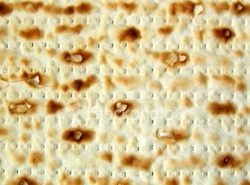
As unleavened bread is pure and free from leaven, so is Yeshua is pure. The matzo is a good representation of our Messiah. Let us examine this bread and how Yeshua is typified by this element:
1. It is pierced. Yeshua was pierced (Jn 19:24; Ps 22:16; Zech 12:10; Rev
1:7)
2. It is bruised. Yeshua was bruised (Isa 28:28; Isa 42:3; Isa 53:5; Matt
12:18-21)
3. It is striped. Yeshua was striped. it is by His stripes we are healed (Isa 53:5)
4. it is pure. Yeshua was without sin. (2 Cor 2:21; 1 Pet 2:22; Heb 4:15; Jn 14:30)
a. Only unleavened bread was used in the Temple because the offerings presented there had to be pure.
5. Yeshua referred to Himself as the "bread of life" in John 6:48.
6. Yeshua was born in Bethlehem, which means "house of bread." (Heb: bêyth lechem)
7. Passover typified the substitutionary death of the Messiah, so Unleavened Bread depicts the burial of the Messiah.
UNLEAVENED BREAD DEPICTS BURIAL OF MESSIAH
JUST as Pesach (Passover) depicts the substitutionary death of the Messiah, so is the Unleavened Bread depicts the burial of the Messiah. Yeshua died a criminal's death in the hands of the Romans but His burial was that of a wealthy man. When a criminal dies he would normally be given a criminal's burial but Yeshua was accorded with honour and respect in His burial. As the Scripture said, Yeshua was buried in new tomb affordable only for the rich people. The donor of the tomb was His secret follower by the name of Joseph of Arimathaea, who was a member of the Sanhedrin and an influential member of the society. His burial declared His innocence and purity. Because Yeshua was without sin (leaven), God did not allow His holy body to be treated with disrespect. His body never decayed or return to dust. David, king of Israel prophesied in Psalms concerning the burial of the Messiah Yeshua (Jesus Christ) . "As a pure, sinless sacrifice, the Messiah was not under the curse to return to the dust."
1. It is pierced. Yeshua was pierced (Jn 19:24; Ps 22:16; Zech 12:10; Rev
1:7)
2. It is bruised. Yeshua was bruised (Isa 28:28; Isa 42:3; Isa 53:5; Matt
12:18-21)
3. It is striped. Yeshua was striped. it is by His stripes we are healed (Isa 53:5)
4. it is pure. Yeshua was without sin. (2 Cor 2:21; 1 Pet 2:22; Heb 4:15; Jn 14:30)
a. Only unleavened bread was used in the Temple because the offerings presented there had to be pure.
5. Yeshua referred to Himself as the "bread of life" in John 6:48.
6. Yeshua was born in Bethlehem, which means "house of bread." (Heb: bêyth lechem)
7. Passover typified the substitutionary death of the Messiah, so Unleavened Bread depicts the burial of the Messiah.
UNLEAVENED BREAD DEPICTS BURIAL OF MESSIAH
JUST as Pesach (Passover) depicts the substitutionary death of the Messiah, so is the Unleavened Bread depicts the burial of the Messiah. Yeshua died a criminal's death in the hands of the Romans but His burial was that of a wealthy man. When a criminal dies he would normally be given a criminal's burial but Yeshua was accorded with honour and respect in His burial. As the Scripture said, Yeshua was buried in new tomb affordable only for the rich people. The donor of the tomb was His secret follower by the name of Joseph of Arimathaea, who was a member of the Sanhedrin and an influential member of the society. His burial declared His innocence and purity. Because Yeshua was without sin (leaven), God did not allow His holy body to be treated with disrespect. His body never decayed or return to dust. David, king of Israel prophesied in Psalms concerning the burial of the Messiah Yeshua (Jesus Christ) . "As a pure, sinless sacrifice, the Messiah was not under the curse to return to the dust."
 RSS Feed
RSS Feed
